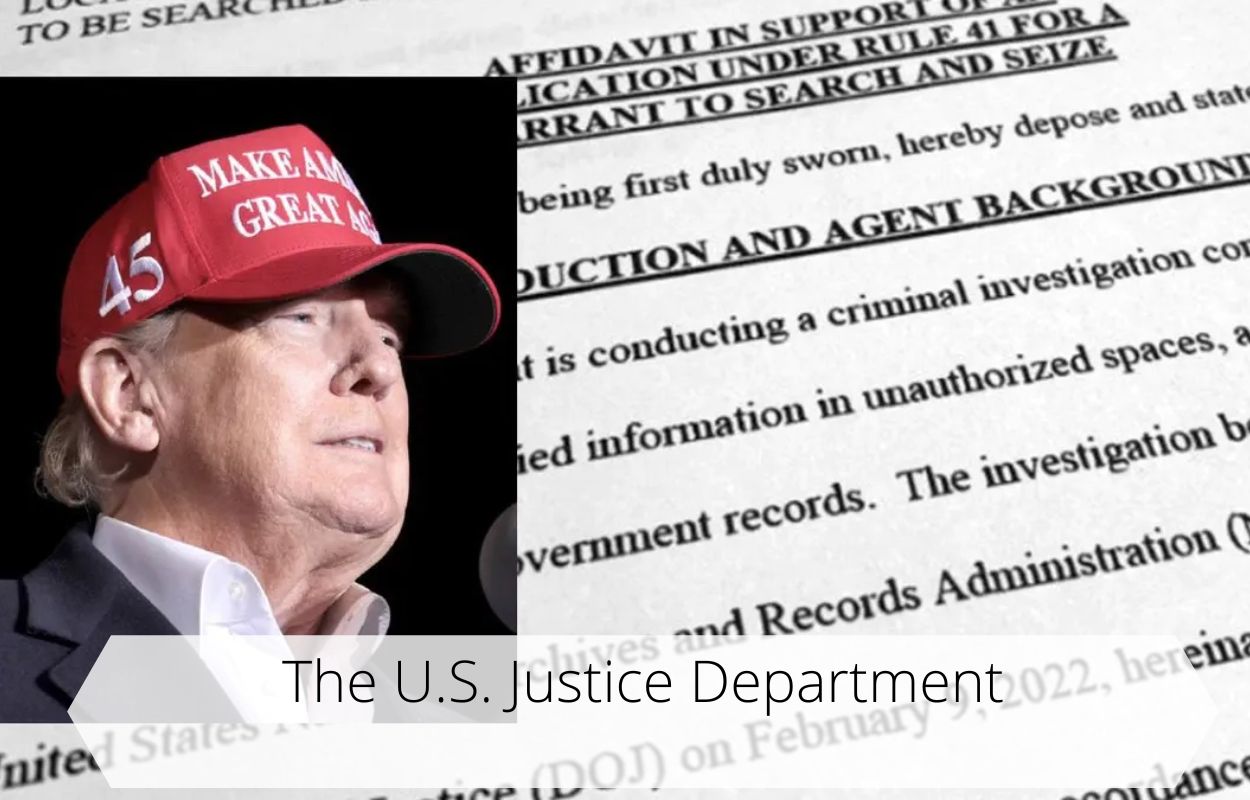- 184 secret documents are cited in the text. Trump held earlier
Affidavit supported FBI search of Trump’s house on August 8
After media outlets sued, a redacted affidavit was made public.
The U.S. Justice Department revealed on Friday that it was looking into allegations that former President Donald Trump improperly possessed data from the White House, including those involving clandestine human sources and intelligence gathering, which are among America’s most carefully held secrets.
The FBI conducted an extraordinary search of Trump’s Florida home on August 8 during which agents seized 11 sets of classified documents, some of which were marked “top secret” and could pose a serious threat to national security if made public, according to a heavily redacted affidavit made public by the department.
After Trump in January delivered 15 boxes of federal papers sought by the U.S. National Archives, the FBI allegedly investigated and discovered 184 documents “bearing classified marks” holding “national defense secrets.” The affidavit claims that other documents in those boxes contained handwritten notes authored by Trump.
The search was a part of a federal inquiry into whether Trump tried to impede the investigation and whether he unlawfully removed and stored records when he left office in January 2021 after losing the 2020 presidential election to President Joe Biden.
Trump, a Republican who is thinking about running for president again in 2024, has already called the court-authorized search at the Mar-a-Lago home in Palm Beach “politically motivated,” and he did so once more on Friday.
The affidavit’s documents also included an unprecedented disclosure: “a considerable number of civilian witnesses” familiar with Trump’s post-presidential behavior were assisting the investigation.
The number of federal and state inquiries into Trump’s time in office and in his private business has significantly increased with the search.
THE PROOF OF OBSTRUCTION
The agent who created the affidavit stated that the FBI had reason to suspect there were still other documents within Mar-a-Lago after reviewing the materials Trump surrendered to the National Archives, the body in charge of maintaining official archives, in January.
The agent said, “There is also reasonable cause to suspect that obstruction evidence will be located at the premises.”
The affidavit revealed that other defense-related documents Trump had turned over made mention of “clandestine human sources” who aid American intelligence gathering, as well as information about how the country conducts foreign surveillance and data it gathered using a law that established the U.S. domestic surveillance program.
- Read More:
- Aston Merrygold, The Star Of The Masked Singer, Tells Who Knew He Was Robin
- The Second Episode Of “She-hulk” Teases Wolverine And Reference “Eternals.”

The Justice Department requested that a significant portion of the 32-page affidavit, a sworn declaration explaining the proof that supported its request for a search warrant, be withheld. At least a piece of each page was blacked out. Some lost all consciousness. With it, six more pages of documents were made public.
The affidavit had been kept under wraps by the department. However, U.S. Magistrate Judge Bruce Reinhart, who approved the search warrant based on the affidavit, ordered the publication of a redacted version on Thursday after media groups filed a lawsuit to make it public.
Trump submitted a “supplemental” motion late on Friday requesting the court to halt the government’s investigation of the records taken at Mar-a-Lago until a “special master” can be appointed to direct the review.
Trump had submitted a comparable move on Monday, but U.S. District Judge Aileen M. Cannon requested further details.
Trump’s attorneys said that their application should be granted because the affidavit was redacted with “virtually no information that would help (Trump) comprehend the reason for the raid or the contents of what was taken from his house. The few lines that remain uncensored lead to more questions than they do solutions.”
Trump asked that Reinhart withdraws from the case on social media, complaining that the leaked affidavit was “heavily redacted” and offering no apparent justification. Such a request has not been made formally by Trump’s legal team.
Trump stated, “Judge Bruce Reinhart should NEVER have permitted the Break-In of my home.”
BIDEN LIGHTENS UP
When questioned by reporters about whether it is ever appropriate for a president to bring home sensitive information, Biden responded, “It depends on the document and on how safe” the location is.
In addition, Biden noted that his home is a “totally safe” location and that he was carrying a copy of his daily intelligence briefing home on Friday. However, he emphasized that the military would eventually receive the information back.
The FBI agent stated in the statement that 184 “unique documents” identified as classified, including 67 marked “confidential,” 92 marked “secret,” and 25 marked “top secret,” were discovered during a preliminary review of records from the Archives earlier received from Trump in May.
The recently made public documents demonstrated how Trump’s allies attempted to downplay the inquiry by claiming he had declassified the relevant information. The affidavit referred to a May article written by Kash Patel, a former member of the Trump administration who referred to media stories about the National Archives locating classified documents at Mar-a-Lago as “misleading.”
Even though much of the information is redacted, Brandon Fox, a former federal prosecutor who is now with the law firm Jenner & Block, said the allusions to Trump’s promises about declassifying the materials are noteworthy.
According to Fox, who spoke to Reuters, “They probably represent the proof the DOJ (Department of Justice) believes it has indicated that Mr. Trump had not declassified the documents.”
Patel said on social media that “politicization by DOJ at its finest” was evident by the fact that his identity was not removed.
The recently made public documents demonstrated how Trump’s lawyers attempted to play down the department’s worries over the records.
Trump’s lawyer Evan Corcoran stated in a letter dated May 25 to a Justice Department official that “any attempt to impose criminal liability on a President or Former President that involves his actions with respect to documents marked classified would implicate grave constitutional separation-of-powers issues.”
Beyond that, the President is exempt from the fundamental criminal legislation that controls the unauthorized removal and retention of classified papers or material, Corcoran continued.




